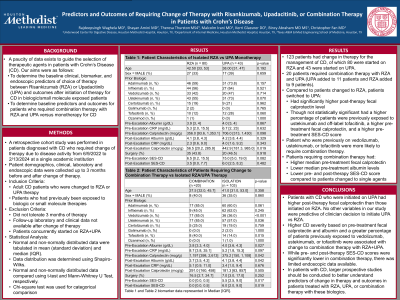Tuesday Poster Session
Category: IBD
P4313 - Predictors and Outcomes of Requiring Change of Therapy to Risankizumab, Upadacitnib, or Combination Therapy in Patients with Crohn’s Disease
Tuesday, October 29, 2024
10:30 AM - 4:00 PM ET
Location: Exhibit Hall E

Has Audio

Rajdeepsingh Waghela, MD
Houston Methodist Hospital
Houston, TX
Presenting Author(s)
Rajdeepsingh Waghela, MD1, Shayan Amini, MD1, Theresa Thurston, 2, Malcolm Irani, MD3, Kerri Glassner, DO4, Bincy P. Abraham, MD, MS, FACG5, Christopher Fan, MD6
1Houston Methodist Hospital, Houston, TX; 2Texas A&M School of Medicine, Houston, TX; 3Lynda K. and David M. Underwood Center for Digestive Disorders, Houston Methodist Hospital, Houston, TX; 4Houston Methodist-Weill Cornell Graduate School of Medical Sciences, Houston, TX; 5Houston Methodist-Weill Cornell, Houston, TX; 6Underwood Center for Digestive Disorders, Houston Methodist Hospital, Houston, TX
Introduction: There is a paucity of data available to guide the selection of therapeutic agents when changing biologic therapy in patients with Crohn’s Disease (CD), with combination therapy used for the treatment of refractory CD. The aim of this study was to determine the predictors of CD medical therapy for providers when choosing between Risankizumab (RIS), Upadacitinib (UPA) and to determine which patients ultimately required combination therapy with RIS and UPA.
Methods: A retrospective cohort study was performed in patients diagnosed with CD who required change of medical therapy due to disease activity from 6/9/2022 to 2/13/2024 at a single academic institution. Patient demographic, clinical, laboratory, and endoscopic data was collected up to 3 months before and after change of therapy.
Results: A total of n = 123 patients had change in therapy for management of refractory CD with n = 80 being started on RIS and n = 43 being started on UPA. Of this, n = 20 patients ultimately required combination therapy with addition of either UPA (n = 11) or RIS (n = 9) to the previous cohort of patients who were already receiving UPA or RIS. Patients switched to RIS had lower initial but not significantly different calprotectin, and a lower post-therapy fecal calprotectin when compared to those started on UPA (356.04 [93.63, 1,353.16] vs 706.00 [313.00, 1,430.00] ug/g, p = 0.019). Patients who had previously been treated with vedolizumab (p< 0.001), ustekinumab (p< 0.036) or tofacitinib (off-label)(p< 0.015) were more likely to require combination therapy. Patients requiring combination therapy had a higher median pre-treatment fecal calprotectin level 1,197.61 [398.14, 2,613.28] vs 375.26 [149.98, 1,108.03] ug/g, (p = 0.042) and lower albumin (3.80 [3.30, 4.00] vs 4.00 [3.60, 4.30] g/dL, p = 0.027). Patients treated with combination therapy had lower SES-CD scores post-therapy than single agents (p = 0.019).
Discussion: In our retrospective cohort, disease severity was the most predictive factor when determining the choice of regimen in patients with CD. The previous biologic therapy patients received was found to associate with the need to change to combination therapy. Patients treated with RIS had lower post-treatment fecal calprotectin, likely related to lower pre-treatment levels. These findings may be affected by the limited number of patients in the studied cohort, and thus further studies with a larger sample size are required to better understand outcomes of change of therapy to these biologics.
Note: The table for this abstract can be viewed in the ePoster Gallery section of the ACG 2024 ePoster Site or in The American Journal of Gastroenterology's abstract supplement issue, both of which will be available starting October 27, 2024.
Disclosures:
Rajdeepsingh Waghela, MD1, Shayan Amini, MD1, Theresa Thurston, 2, Malcolm Irani, MD3, Kerri Glassner, DO4, Bincy P. Abraham, MD, MS, FACG5, Christopher Fan, MD6. P4313 - Predictors and Outcomes of Requiring Change of Therapy to Risankizumab, Upadacitnib, or Combination Therapy in Patients with Crohn’s Disease, ACG 2024 Annual Scientific Meeting Abstracts. Philadelphia, PA: American College of Gastroenterology.
1Houston Methodist Hospital, Houston, TX; 2Texas A&M School of Medicine, Houston, TX; 3Lynda K. and David M. Underwood Center for Digestive Disorders, Houston Methodist Hospital, Houston, TX; 4Houston Methodist-Weill Cornell Graduate School of Medical Sciences, Houston, TX; 5Houston Methodist-Weill Cornell, Houston, TX; 6Underwood Center for Digestive Disorders, Houston Methodist Hospital, Houston, TX
Introduction: There is a paucity of data available to guide the selection of therapeutic agents when changing biologic therapy in patients with Crohn’s Disease (CD), with combination therapy used for the treatment of refractory CD. The aim of this study was to determine the predictors of CD medical therapy for providers when choosing between Risankizumab (RIS), Upadacitinib (UPA) and to determine which patients ultimately required combination therapy with RIS and UPA.
Methods: A retrospective cohort study was performed in patients diagnosed with CD who required change of medical therapy due to disease activity from 6/9/2022 to 2/13/2024 at a single academic institution. Patient demographic, clinical, laboratory, and endoscopic data was collected up to 3 months before and after change of therapy.
Results: A total of n = 123 patients had change in therapy for management of refractory CD with n = 80 being started on RIS and n = 43 being started on UPA. Of this, n = 20 patients ultimately required combination therapy with addition of either UPA (n = 11) or RIS (n = 9) to the previous cohort of patients who were already receiving UPA or RIS. Patients switched to RIS had lower initial but not significantly different calprotectin, and a lower post-therapy fecal calprotectin when compared to those started on UPA (356.04 [93.63, 1,353.16] vs 706.00 [313.00, 1,430.00] ug/g, p = 0.019). Patients who had previously been treated with vedolizumab (p< 0.001), ustekinumab (p< 0.036) or tofacitinib (off-label)(p< 0.015) were more likely to require combination therapy. Patients requiring combination therapy had a higher median pre-treatment fecal calprotectin level 1,197.61 [398.14, 2,613.28] vs 375.26 [149.98, 1,108.03] ug/g, (p = 0.042) and lower albumin (3.80 [3.30, 4.00] vs 4.00 [3.60, 4.30] g/dL, p = 0.027). Patients treated with combination therapy had lower SES-CD scores post-therapy than single agents (p = 0.019).
Discussion: In our retrospective cohort, disease severity was the most predictive factor when determining the choice of regimen in patients with CD. The previous biologic therapy patients received was found to associate with the need to change to combination therapy. Patients treated with RIS had lower post-treatment fecal calprotectin, likely related to lower pre-treatment levels. These findings may be affected by the limited number of patients in the studied cohort, and thus further studies with a larger sample size are required to better understand outcomes of change of therapy to these biologics.
Note: The table for this abstract can be viewed in the ePoster Gallery section of the ACG 2024 ePoster Site or in The American Journal of Gastroenterology's abstract supplement issue, both of which will be available starting October 27, 2024.
Disclosures:
Rajdeepsingh Waghela indicated no relevant financial relationships.
Shayan Amini indicated no relevant financial relationships.
Theresa Thurston indicated no relevant financial relationships.
Malcolm Irani indicated no relevant financial relationships.
Kerri Glassner: Eli Lilly – Advisor or Review Panel Member. Janssen – Advisor or Review Panel Member. Pfizer – Advisor or Review Panel Member, Speakers Bureau.
Bincy P. Abraham: AbbVie – Consultant, Speakers Bureau. Bristol Myers Squibb – Consultant, Speakers Bureau. Celltrion – Consultant. Eli Lilly – Consultant, Speakers Bureau. Fresenius Kabi – Consultant. Janssen – Consultant, Speakers Bureau. Medtronic – Consultant. Pfizer – Consultant, Speakers Bureau. Prometheus – Consultant. Samsung Bioepis – Consultant. Takeda – Consultant, Speakers Bureau.
Christopher Fan indicated no relevant financial relationships.
Rajdeepsingh Waghela, MD1, Shayan Amini, MD1, Theresa Thurston, 2, Malcolm Irani, MD3, Kerri Glassner, DO4, Bincy P. Abraham, MD, MS, FACG5, Christopher Fan, MD6. P4313 - Predictors and Outcomes of Requiring Change of Therapy to Risankizumab, Upadacitnib, or Combination Therapy in Patients with Crohn’s Disease, ACG 2024 Annual Scientific Meeting Abstracts. Philadelphia, PA: American College of Gastroenterology.

